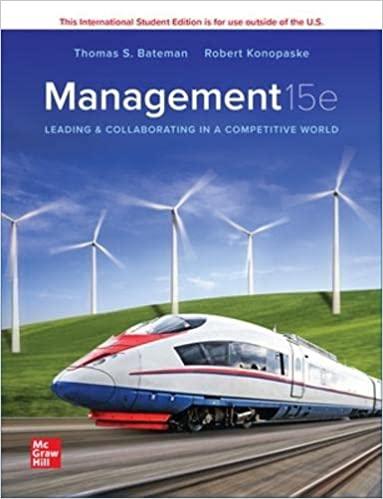Apple is famous for its attractive and highly prized electronics, including iPhones, Mac computers and laptops, and
Question:
Apple is famous for its attractive and highly prized electronics, including iPhones, Mac computers and laptops, and iPad tablets. However, Apple doesn’t actually make any of its products. Rather, it develops ideas, designs devices, and promotes the products and its brand. To put the devices together, Apple relies on a set of contractors.
One key contractor is an electronics firm called Foxconn, based in Taiwan. With factories located in China, Foxconn has combined manufacturing expertise with low-cost labor to win deals to make computers and key components such as motherboards. As consumers have slowed their spending on laptop computers in favor of smaller devices such as the iPad tablet computer and smartphones, Foxconn has benefited. Until recently, it was the only company making Apple’s iPad and one of just two makers of Apple’s iPhone. Workers at Foxconn facilities also produce the Sony PlayStation 3, the Nintendo Wii, and Amazon’s Kindle Fire.
Foxconn also produces TVs for Sony, Sharp, and Toshiba.
In China alone, Foxconn employs almost 1.2 million workers, making it one of the largest employers in the world. Many workers in China live in on-site dormitories, eat in company run dining halls, and relax in bookstores and gyms at their workplace.
Foxconn has experienced some tragic problems. In 2010, the company drew international media attention when several workers at Foxconn’s plant in Shenzhen (a city in southern China) committed suicide. Questions arose about whether working conditions were so horrible as to drive workers to kill themselves. Apple sent executives, accompanied by suicide prevention experts, to the plant to investigate.
Although Apple requires its contract partners to meet specific standards in its code of conduct, and it visits over 100 facilities a year to ensure compliance, it had failed to uncover any problems at Foxconn before the suicides came to light.
The next year, Foxconn was again in the news about another tragedy when an explosion in its Chengdu, China, plant killed 3 workers and injured 15. Initial investigations suggested that the explosion was the result of a fairly basic manufacturing safety problem: Because of improper ventilation, dust collected in the air of a metal-polishing shop, and the dust ignited. If such a problem occurred in the United States, regulators would quickly shut down the facility for violating safety requirements.
Embarrassed by the media and pressured by important customers including Apple, Foxconn acted to improve working conditions. At the Shenzhen plant, it brought in counselors, improved training of managers and staff who answered calls on the employee hotline, and launched a morale-boosting program called Care–Love that sponsors employee outings. In the factories in Chengdu and elsewhere, the company took measures to improve ventilation.
Along with these changes, Foxconn began giving out raises, and Shenzhen workers’ wages more than doubled.
After Foxconn launched its efforts to improve morale, employee turnover fell, and the suicides seem to have ended. Financial impact on the company is difficult to measure. Higher costs erased profits, and Foxconn’s stock price tumbled. So, the company looked for lower-cost locations.
It opened facilities in China’s interior cities, where wage rates are about one-third below those of Shenzhen.
Making matters more challenging for Foxconn is the fact that it intends to cut nearly $3 billion from its operating costs, which will likely result in layoffs. The news comes on the heels of reports that Apple’s iPhone XS, XS Max, and XR didn’t sell as well as expected in 2018.
Apple CEO Tim Cook shifted some of the production of iPhones and iPad minis to Pegatron, another Taiwan-based electronics manufacturer. Pegatron also makes products for Microsoft, Dell, and Hewlett-Packard.
Foxconn also made news in the United States, announcing in early 2021 that it would manufacture electric vehicles in Wisconsin for EV start-up Fisker. Groundbreaking for a huge project was several years earlier, when Foxconn, Governor Scott Walker, and President Trump announced a planned LCD factory that would create a manufacturing juggernaut to be called Wisconsin Valley. But Foxconn failed to meet construction, employment, and other benchmarks, and scrapped its projected product ideas. The project foundered.
Meanwhile, Foxconn announced it was moving a significant amount of its iPad production to Vietnam, and Pegatron was poised to begin iPhone manufacturing in India.
Perhaps the Foxconn–Fisker deal will rescue one of the country’s biggest economic development projects. Foxconn planned to begin production in late 2023 for Fisker’s second EV model, a high-volume operation targeting markets in the United States, Europe, China, and India.
DISCUSSION QUESTIONS
1. What threats, opportunities, strengths, and weaknesses can you identify at Foxconn? How has it responded, strategically?
2. If Foxconn’s management hired you to offer advice on improving its ethical decision making and corporate social responsibility, what would you suggest? Why?
3. Why do you think Tim Cook, after years of using Foxconn for most of Apple’s production needs, shifted some production to Pegatron? And what are your theories about why both suppliers moved some production to two other countries? If you were Apple, where else would you consider producing?
Step by Step Answer:

Management Leading And Collaborating In A Competitive World
ISBN: 9781265051303
15th International Edition
Authors: Thomas S Bateman, Scott A Snell, Robert Konopaske





